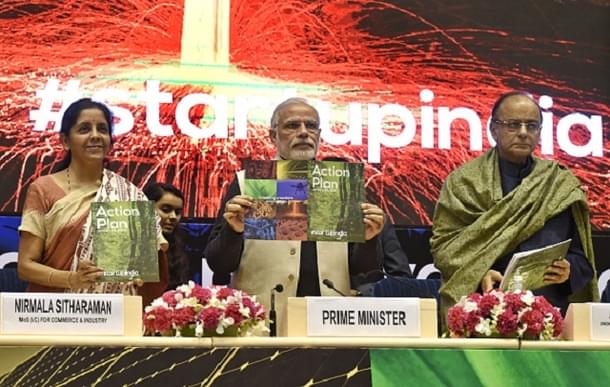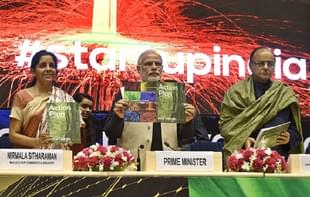Business
Startup India Action Plan Falling Short
Harish H.V. and Shashishekhar Chaugule
Jun 13, 2017, 01:16 PM | Updated 01:16 PM IST
Save & read from anywhere!
Bookmark stories for easy access on any device or the Swarajya app.


A little over a year ago, the government launched with much fanfare its ambitious initiative for start-ups. An action plan with 19 measures focusing on simplification and hand-holding, funding support and industry-academia partnership and incubation was outlined. However, the government’s initiative has had an impact on only a small section of start-ups and a lot more needs to be done to provide a strong fillip to the start-up world.
To facilitate ease of doing business, the government promised a compliance regime based on self-certification. To this effect, it issued an advisory to states, union territories, Employees’ Provident Fund Organisation and Employees’ State Insurance Corporation offices not to inspect start-ups in the first year of set-up and, for the next three years, only with the approval of a senior officer. So far, 12 states have confirmed compliance with the advisory. Also, the union ministry of environment, forest and climate change has notified 36 industry sectors that are practically non-polluting as belonging to a white category. Both measures will assist start-ups in not being subjected to inspection or approvals.
A fast-track, low-cost intellectual property regime was promised. Now, a list of more than 400 empanelled patent and trademark registration agents is published, and the government is supposed to pay them for services to recognised start-ups. However, there are only 1,006 such recognised start-ups that enjoy these benefits.
We believe all start-ups, regardless of whether they are considered innovative by the government, should be able to enjoy these benefits, so as to encourage entrepreneurship and generate jobs. The government should not get into defining and deciding what innovation means.
A critical measure to enable start-ups which could go on to fail (and a lot of them do) is the ease of closure. In this regard, the rules for voluntary liquidation are still in the works and we hope they will be released and notified soon permitting start-ups to wind up business within 90 days.
The government is a huge buyer of goods and central ministries and departments have been directed to relax the turnover and experience criteria for public procurement, so as to promote purchases from start-ups. However, this is unlikely to have a meaningful impact unless the number of recognised starts-up is in the thousands. The Government e-Marketplace—GeM—is a good beginning but it is not focused on start-ups.
The most headline-grabbing announcement by the government about start-ups was instituting a Rs10,000 crore fund-of-funds. The Small Industries Development Bank of India has been given the task of operating and managing this fund, which will invest in alternate investment funds registered with the Securities and Exchange Board of India (Sebi). So far, there have been only limited disbursements—commitments to the tune of about Rs600 crore have been made and there is a budget allocation of Rs1,100 crore. This is a small amount compared to the nearly Rs16,000 crore start-up funding in 2016 (source: Grant Thornton Dealtracker). Also, the details of the promised credit guarantee fund for start-ups are not out yet except that it is intended to have a corpus of Rs2,000 crore, to be built over four years.
Taxation is usually not the priority issue for most start-ups who are struggling to break even; it is only when they become profitable that they have to worry about paying tax. Since start-ups don’t make profits in their early period and the minimum alternative tax is still applicable, the benefits of a three-year tax holiday are only notional.
The Finance Act 2016 allowed exemptions to long-term capital gains if those are invested in units of specified funds. Exemption was also introduced for long-term capital gains arising upon transfer of a residential property if such gains were invested in an eligible start-up. But there have been few instances of these benefits being lapped up by the start-up ecosystem.
Exemption from “angel tax” was a more relevant sop as investment by residents in eligible start-ups stood to gain from this concession. While this amendment is helpful, it falls short of the intended impact as only 13 start-ups have been certified so far for tax benefits.
The government also promised to build a start-up culture in the country. A call centre was operationalised to resolve queries and provide hand-holding support to start-ups. A website and mobile app were launched with information on the start-up action plan, incubators and IP facilitation. An interactive online learning and development module to educate start-ups and aspiring entrepreneurs was launched. Start-up fests were announced—but apart from one in Delhi, there have been no other festivals. The Grand Challenge award is also yet to take off. It is our belief that such hand-holding is the job of incubators and accelerators, and the government should focus on clarifying policy questions.
It is commendable that the government thought of start-ups as a separate category, recognised their potential, and came out with a visionary plan to promote start-up culture and entrepreneurship in India. However, much of its efforts have been restricted by what we can term bureaucratic impediments, so progress has been limited. The government needs to review the policy soon, remove impediments and give a stronger impetus to start-ups. Importantly, it also needs to reduce the flight of successful start-ups to other jurisdictions.
This piece was originally published in Mint and has been republished here with permission.





